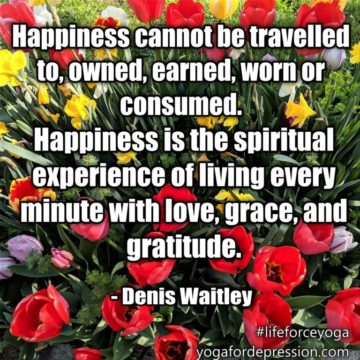Gratitude is more than just saying thank you. It is an appreciation for and celebration of life. We notice the little things that enrich our lives and express appreciation for the multitude of abundances that life brings. But how do you find thankfulness when things are not going well? When we feel anxious, hurt, and/or isolated, gratitude may be the furthest thing from our minds. The practice of gratitude is key to our happiness and mental health. In a study conducted at UC Berkeley, students seeking support for mental health wrote a weekly letter of gratitude to one person. After four weeks, these students reported significantly better mental health. At 12 weeks after the study, students continued to report an increase in mental health.

Research on gratitude indicates that developing a daily practice of thankfulness improves overall mental health. In a 2003 study conducted by Emmons & McCullough, participants were asked to focus on one of the following conditions: hassles, gratitude listing, or neutral life events. Participants then kept a record of their moods, coping & health behaviors, physical symptoms, and life appraisals. In general, participants involved in gratitude listing reported elevated well-being as well as greater optimism. If you wish to read more, Emmons provides a brief overview of research in a 2013 research article. [From our 2016 blog on Gratitude]
Why does gratitude matter?
Manners make us more likeable! When we are grateful, we express it in the form of saying thankful to people. One study found that being polite increased the likelihood of new relationships. Who wouldn’t want to spend more time with a appreciative person?
Improves physical health. A 2012 study published in Personality and Individual Differences, grateful people experienced less physical pain and were more likely to exercise and take care of themselves.
Improves psychological health. Robert Emmons, leading researcher on gratitude, has conducted a number of studies on the link between gratitude and well-being. When we are grateful, it reduces the load of emotions that can be toxic, like envy, resentment, and frustration. Gratitude redirects our focus from what we don’t have to what we do have.
Increases empathy and reduces aggression. We are more likely to be kind to someone when they behave poorly when we are thankful. We are even more forgiving.
Enhances sleep. A 2011 study published in Applied Psychology: Health and Well-Being, shows that spending 15 minutes writing gratitude statements helped people to sleep longer and better. If you take an inventory of what enhanced your day your mindset will be one of abundance as you drift to sleep, rather than anxious.
Improves self-esteem. When we are grateful, we are less likely to compare ourselves to others. We begin to celebrate our strengths rather than focus on our weaknesses.
Increases mental strength. As we are seeing in this list, gratitude focuses the mind on what we have, even in the midst of loss. In two studies, one with Vietnam Veterans and another following the September 11th attacks, found that grateful individuals experienced less instances of post traumatic stress disorder. Grateful brains are resilient brains!
This list originally appeared on Psychology Today.
The Practice of Gratitude
- Let’s start journaling. This month, starting today, join us in creating a Gratitude Journal. You can use your existing journal, or get a special on. Every evening, take 5 minutes to write down 3 – 5 things for which you are thankful. You can write a simple list of key words, or write paragraphs, whatever feel natural for you. No matter what, identify 3-5 things that brought you joy, ease, or happiness during your day. Because gratitude can help you sleep better, this might be a great practice right before you go to bed.
- Say thank you to you! In addition to the 3 – 5 things that you are thankful for, thank yourself. What did you do today that deserved praise? Perhaps you woke up on time. Maybe you ate your vegetables. It could be something small or big. Don’t limit yourself.
- Say thank you more. There are many places in our daily life where we can express gratitude, that we often don’t. Even something as simple as a wave when someone lets you into traffic is an expression of gratitude. Say thank you when someone gets the door for you, or when someone move out of your way at the store. Remember to thank the people that wait on you at restaurants, retail stores, and grocery stores.

I am very very interested.